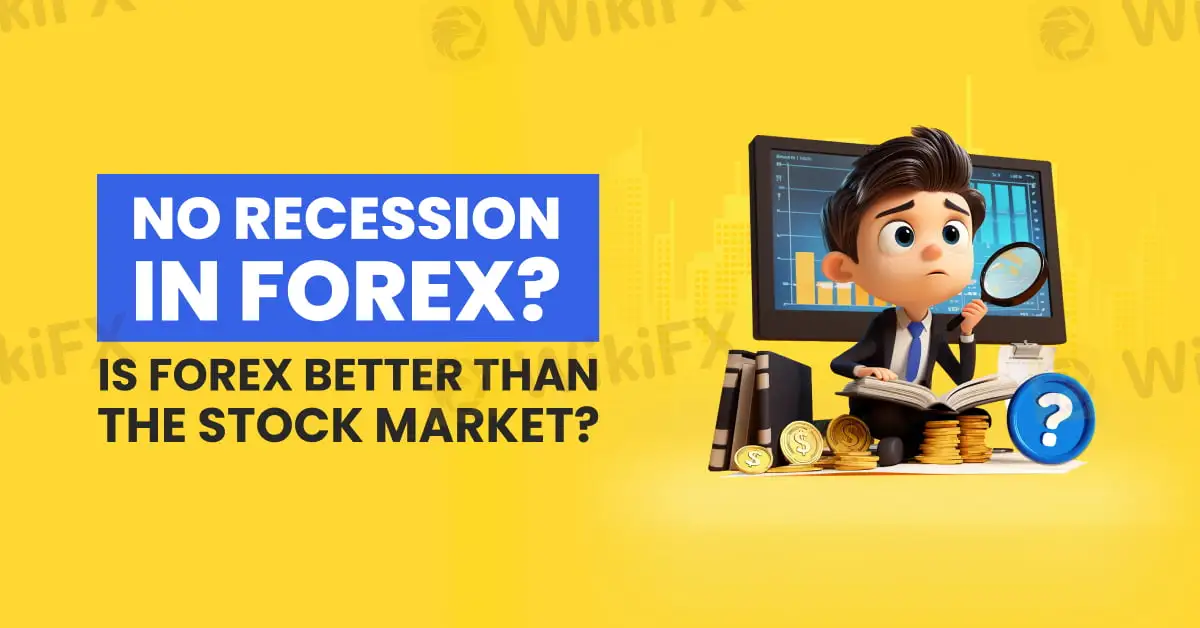简体中文
繁體中文
English
Pусский
日本語
ภาษาไทย
Tiếng Việt
Bahasa Indonesia
Español
हिन्दी
Filippiiniläinen
Français
Deutsch
Português
Türkçe
한국어
العربية
No Recession in Forex? Is Forex Better Than the Stock Market?
Abstract:As equity markets recently convulse under the pressure of rate uncertainty, geopolitical risk, and weakening macroeconomic signals, an age-old question resurfaces: when the stock market shakes, is it time to look elsewhere?

As equity markets recently convulse under the pressure of rate uncertainty, geopolitical risk, and weakening macroeconomic signals, an age-old question resurfaces: when the stock market shakes, is it time to look elsewhere? And more precisely, to the foreign exchange market?
The notion that the forex market is immune to recession is not without controversy. Critics may scoff at such a statement as overly simplistic or even dangerously misleading. Yet, when one steps back to assess how traders operate across different asset classes, the suggestion begins to gather some weight.

Unlike stock markets, which are tied to corporate earnings and investor sentiment, the forex market is inherently a relative game. Currency pairs reflect one country‘s economic health versus another’s as when one falls, the other rises. It‘s this duality that allows forex to remain perpetually active, even during global downturns. As some like to argue, there’s no recession in forex, because traders always have something to trade, regardless of whether the underlying news is bullish or bearish.
Consider the case during the 2008 financial crisis. While equities plummeted, the US dollar gained strength as a safe-haven currency. Traders who were quick to rotate into major pairs capitalised on volatility, using macro fundamentals and central bank policy divergence as navigational tools. Fast-forward to the COVID-19 pandemic: again, stocks whiplashed, but the forex market thrived on central bank interventions and stimulus differentials.
However, the idea that forex offers a “safe haven” is worth interrogating. Safety and volatility are not synonymous, and if anything, the FX market‘s 24-hour cycle and high leverage options present their own set of risks. It’s not uncommon for novice traders to be seduced by rapid price action, only to be caught out by unexpected central bank shifts or flash crashes.
Yet, for the seasoned trader, these very elements of unpredictability can be opportunity-laden. While equity investors often must wait for quarterly earnings or macro reports, forex traders react to real-time economic data, political headlines, and sentiment flows. Liquidity is rarely in short supply as daily trading volumes exceed $7 trillion, dwarfing those of the stock market.
Moreover, forex trading doesn't rely on the overall economy “doing well”. In fact, chaos often breeds opportunity. When interest rates diverge or political risk upends a nations monetary policy, currency movements can be swift and substantial. For traders who thrive on macro narratives, forex may feel more like chess than roulette.
That said, this is no endorsement of forex as a guaranteed hedge against stock market collapse. Every market carries risk, and forex is no exception. But perhaps it's time to challenge the traditional binary of equities vs. safety assets. Could forex be not just a temporary escape but a dynamic arena in its own right?
If nothing else, one thing is clear: when equity markets falter, forex doesn‘t sleep. And maybe, just maybe, that’s what makes it worth a closer look.

Disclaimer:
The views in this article only represent the author's personal views, and do not constitute investment advice on this platform. This platform does not guarantee the accuracy, completeness and timeliness of the information in the article, and will not be liable for any loss caused by the use of or reliance on the information in the article.
Read more

Trade Journal 2.0: What Experienced Traders Track That Beginners Often Ignore
A Trading Journal is more than a basic record of trades. It’s a learning and improvement tool. Beginners often jot down only price and time. Experienced traders add deeper insight that helps them get better over time. Here's what they track:

6 Red Flags to Notice Before Investing in Neuron Markets
Investment scams have been rising over the last 5–6 years. Therefore, you need to be alert in the forex market, as many scam brokers are active and waiting to exploit inexperienced investors and traders. Neuron Markets is one such broker that appears genuine and makes big promises but ends up swindling investors’ money. Checkout red Flags and stay Safe

Future of Forex in India: Growth or Global Domination?
Every Trader or Investor in India who wants to invest in the dynamic forex market must read this important article. It explores the future of the forex market in India and answers a common question: Forex market will rise or crash in India ? Checkout the article below.

Spread vs Swap: How Can They Affect Your Trading
In forex trading, success is not only about predicting price movements correctly. It also depends on understanding the costs involved. Two of the most important charges that every trader should factor in are the spread and the swap. These are key components of the overall forex trading fee charged by brokers, and both can have a direct impact on the outcome of a trade.
WikiFX Broker
Latest News
Global week ahead: Crunch time for trade talks as Trump's deadline nears
Top Wall Street analysts recommend these dividend stocks for regular income
Stock futures rise as U.S.-EU trade deal kicks off a hectic week for markets: Live updates
Samsung Electronics signs $16.5 billion chip-supply contract; shares rise
Does XS.com Hold Leading Forex Regulatory Licenses?
European stocks set to rise after the U.S. and EU strike trade agreement
Elon Musk confirms Tesla has signed a $16.5 billion chip contract with Samsung Electronics
Chile Bumps Up Copper Price Forecast and Flags Lagging Collahuasi Output
Bitget Lists Caldera for Spot Trading | What Should You Know?
Treasury yields tick lower as investors look ahead to Fed's interest rate decision
Currency Calculator



